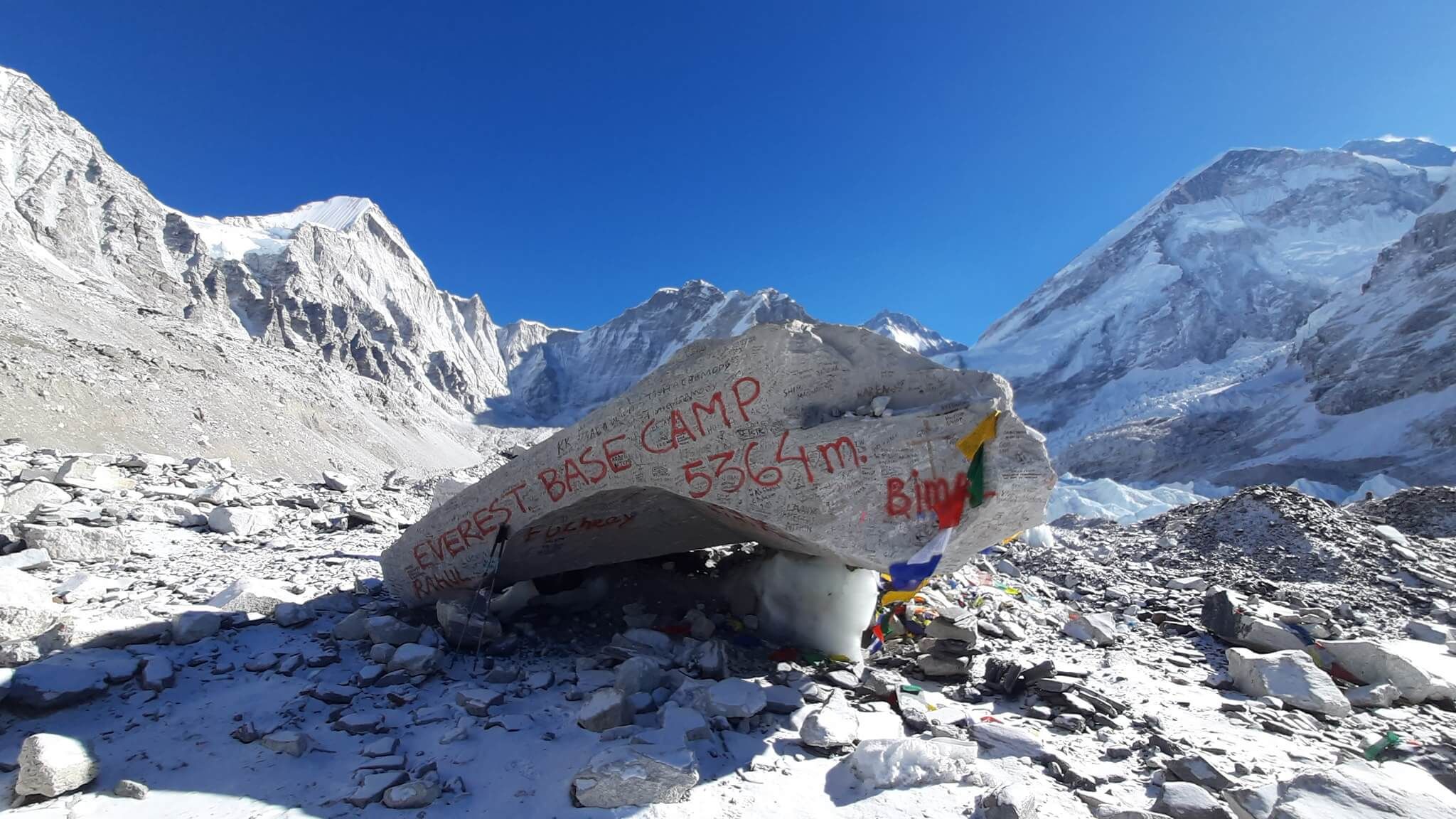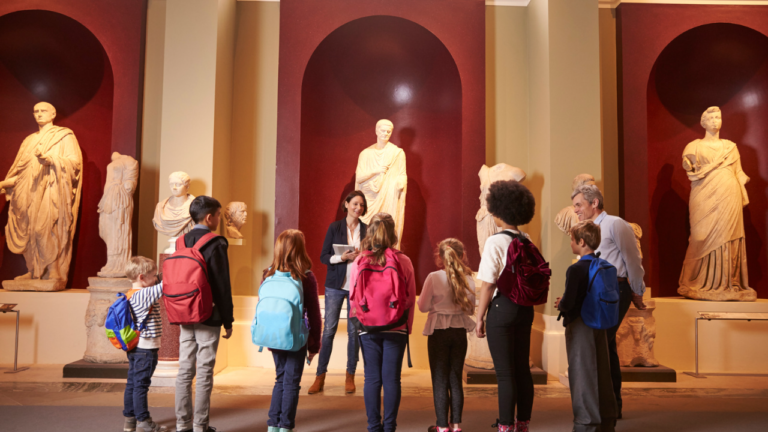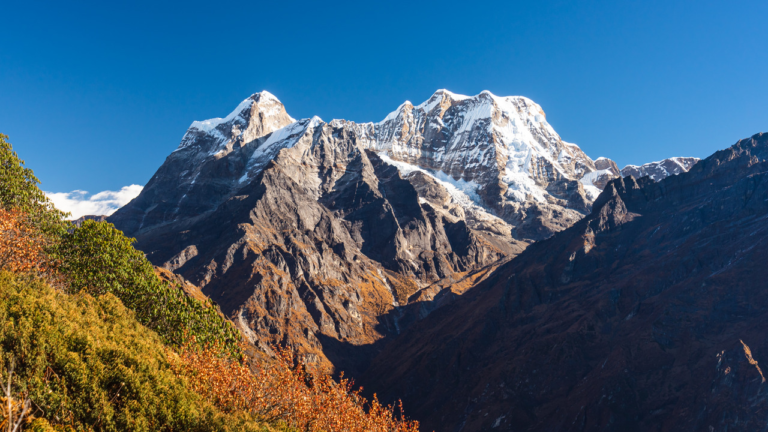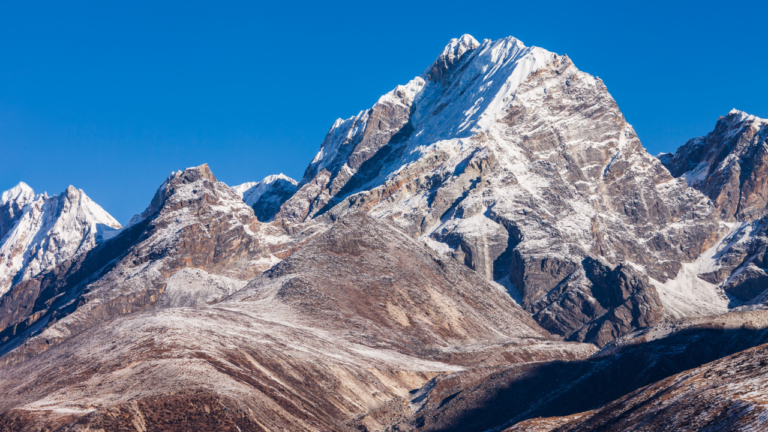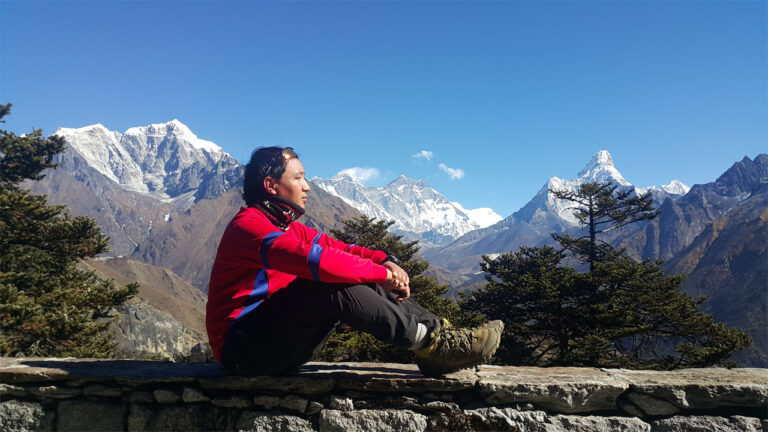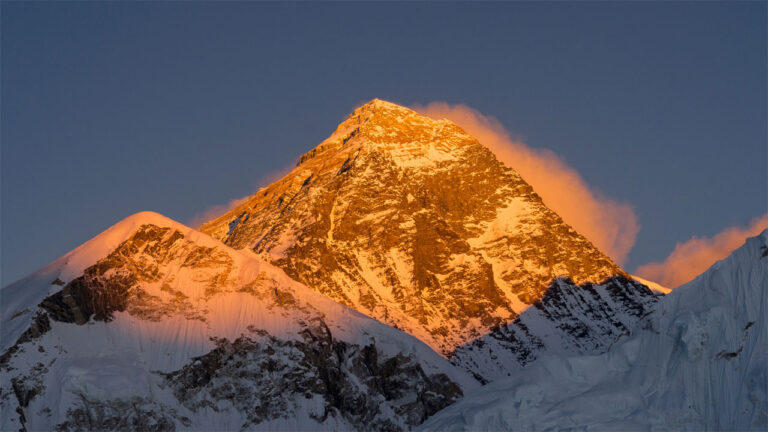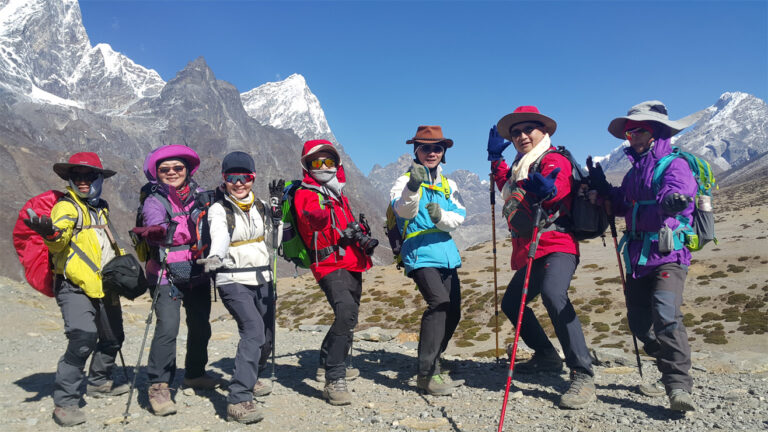Sleep at Everest Base Camp
Trek to the base camp of the world’s highest mountain and sleep at Everest Base Camp [5,364m/17,559ft]. Stay overnight at Everest base camp with the Everest expedition team and get a peek into the lives of climbers while confronting the highest peak in the world and numerous peak surrounding your very presence.
Trip Overview
Highlights
- A night in the confines of the Himalayas at Everest Base Camp
- A peek into the lives of climbers at base camp
- Trek to the Everest Base Camp and Kalapathar for scintillating views of himalayan range.
- Explore the rich biodiversity of the enchanting Sagarmatha National Park
Trek to the base camp of the world’s highest mountain (Mt. Everest) and sleep overnight at Everest base camp confronting the highest peak in the world. Numerous peaks surrounding your very presence, the warm breath of your nose turns misty telling you are amidst the Himalayas. Views of jagged peaks blanketed by snow as in a fairytale and a chance to spend the night in this dreamland. Of sublime excitement are the experiences offered by the Sherpa villages and culture while on the trek. These are what make our Sleep at Everest Base Camp trip one of the most exclusive adventure trekking.
Itinerary Overview
Everest base camp overnight trek starts with your arrival in Kathmandu and a sightseeing tour of UNESCO World Heritage sites in this beautiful city. The warmth of this city will fade as you catch a scenic mountain flight to Lukla with guaranteed cool weather and a gorgeous landing at an exciting airport. The beautiful Himalayas expose themselves as you begin on a trail to Phakding.
In no time the journey begins to entice you with striking views of vast valleys and glimpses of snowcapped peaks including Kusum Khangkaru (6367m) and Thamserku (6603m). Namche Bazaar is a major tourist hub and a stop for acclimatization. Enjoy glorious views of Mount Everest (8848m) from Namche as you saunter through thickets of rhododendron and pine trees onto the spiritual hub of the Khumbu region- Dingboche, Pangboche, and Tengboche.
A trek during the spring season, the blooming season for floras including rhododendron, will colour the hills red and the bliss of toiling through the trail is second to none. And then the colourful aura turns stark and barren with nothing in contrast but crystal snow which engulfs a strenuous rocky terrain.
The stops at Gorakshep and Kalapatthar are for the exquisite views of the Himalayas. Nothing stands between you and Mount Everest (8848m), Nuptse (7861m), Lhotse (8414m), Pumori (7165m), and Khumbutse (6636m) among others. Top it off with a night among these gigantic wanders of the world with nothing but the sparkling sky as the roof. Hopefully, this moment will be your nirvana.
What makes Everest base camp overnight trek different?
Unlike the standard Everest Base Camp Trek which takes you to the Everest base camp and retraces back to Gorekshep for overnight, Everest Expeditions Nepal offers you this once in a lifetime opportunity to trek to the base camp of the world’s highest mountain and sleep at Everest base camp.
Stay overnight at the Everest base camp for 1 night. Boasting an experienced lineup of professionals and having served the tourism industry for more than 30 years, we request you to give us an opportunity to make your visit worthwhile.
Is this trek for you?
Our sleep at Everest base camp trek is a total of 16N/17 days trip with 12N/13 days on trek including one night at Everest base camp [5,364m/17,559ft] on tented camping. The trek is physically challenging due to trekking at higher altitudes for longer days and the maximum elevation you gain is [5,545m/18,193ft] at Kalapathar.
No previous experience of trekking at a higher altitude is required but you should be comfortable walking 6-8 hours per day and adaptable to high altitude conditions. Our itinerary is designed keeping every aspect in mind such as well-paced walk, acclimatization, good campsites, etc
Why trek with Everest Expeditions Nepal?
At, Everest Expeditions Nepal it is our aim to provide a wonderful holiday in our part of the world and ensure that our clients enjoy the holiday as much as possible with minimized risks and the worry-free trip should it be monetary, physical or emotional.
All the logistical arrangements required for the trip will be done prior to your arrival providing you with a hassle-free journey and on the trek, you will be led by an experienced and medical trained guide/leader with a high staff ratio.
Considering the safety of our utmost priority, all our Everest Base Camp trek groups are backed up with a Supplementary oxygen system, oximeter, and medical kit be it a group of 1 participant or 15 participants.
On the trek, all meals and accommodation are included too and we provide you with an option of OPEN/CHOICE menu meaning you can choose your meal straight from the menu. Our itineraries are also devised keeping every aspect in mind such as acclimatization, good campsites, real-life experiences, etc.
Customize this trip?
If you wish to make any changes to this itinerary please feel free to contact us and we will tailor the trip as per your preferences. You can add Gokyo Lakes Trek, an Island peak climb or Lobuche East Climb on this itinerary, or perhaps take a helicopter flight to Kathmandu from the base camp instead of walking all the way back down.
Kindly let us know your preferences should you wish to make any changes and we will tailor an itinerary exclusively made for you.
Important Note: Your safety is of imperative concern while travelling with Everest Expeditions Nepal. Please take care to note that your leader has the authority to amend or cancel any part of the itinerary if it is deemed necessary due to your safety concerns. Every effort will be made to keep to the above itinerary; however, since this adventure entails travelling in remote mountainous regions, we cannot guarantee that we will not deviate from it. Weather, health condition of a group member, unexpected natural disasters, etc., can all contribute to changes in the itinerary. The trek leader will try to ensure that the trip runs according to plan, but please be prepared to be flexible if required.
Day 01 – Arrival in Kathmandu [1,350m/4,430ft]
Arrival at Tribhuvan International Airport, Nepal. Upon completing the visa formalities and collecting your luggages in the airport, kindly proceed to the exit of the arrival hall. Your trip leader will await you just outside the arrival hall and will escort you to your hotel in Kathmandu. Please look out for a placard of Everest Expeditions Nepal at the exit of arrival hall. Welcome drinks will be served and after you’ve refreshed, your trek leader will brief you about your trip in the lobby of your hotel in the evening. Get familiar with your surroundings by taking a walk down the street and at eventide relish a welcome dinner at typical Nepalese restaurant.
- Meal: Dinner
- Accommodation: Hotel
Day 02 – Exploration of Kathmandu and trek preparation [1,350m/4,430ft]
Your arrival is followed by a sightseeing tour of the Capital city of Nepal. With two of the most famous UNESCO World Heritage sites on the itinerary, start off with a tour of Boudhanath. Then take a short trip to Pashupatinath. This is a famous Hindu shrine flocked by devotees from Nepal and India. Overnight stay at a hotel in Kathmandu.
- Meal: (B)
- Accommodation: Hotel
Day 03 – Fly to Lukla and trek to Phakding [2,600m/8,531ft]
Wake up early in the morning and leave from the hotel at approx 5 am to catch a flight to Lukla. Flight times are generally scheduled for early morning and the exact airport time will be announced a day earlier.
At Lukla, we are immediately overcome by the scale of the massive peaks that surround the village but this is only an indication of what is to come. After meeting the crew, we head up the Dudh Koshi Valley on a well-marked trail and then stay overnight in Phakding.
Overall elevation gain tonight from previous night: 1,250m/4,100ft
- Meal: (B,L,D)
- Accommodation: Teahouse/Lodge
- Trekking Hours: 3-4 hrs
Day 04 – Trek to Namche Bazar [3,450m/11,319ft]
Heading up the trail, you cross a pine forest along the Dudh Koshi River and valley. Moving over to the other side of this river at Bengkar continue to Monjo. Striking views of Kusum Kanguru (6367m) and Thamserku (6603m) blow you away as you arrive at Jorsalle which is the gateway to Sagarmatha National Park. Crossing the pristine Dudh Koshi, a steep ascent in the final stretch will land you at the hub of Khumbu, Namche Bazaar. Overnight stay at Namche.
- Meal: (B,L,D)
- Accommodation: Teahouse/Lodge
- Trekking Hours: 6-7 hrs
Day 05 – Rest and acclimatization day [3,450m/11,319ft]
Acclimatizing to drastic gain in altitude, you take this day off the main trail to wander around the beautiful town of Namche Bazaar. This town is home to a Sherpa Museum that houses relics from the Sherpa community, natives of the Himalayas. Popular is a hike up to Hotel Everest View for a splendid vista of Mount Everest (8848m). Stop at the local market of Namche to stock up on comfort foods or other essentials for the rest of this trek. Overnight stay at Namche.
- Meal: (B,L,D)
- Accommodation: Teahouse/Lodge
- Trekking Hours: 3-4 hrs
Day 06 – Trek to Deboche [3,720 m/12,205ft]
Back on the trail, you set out for Debuche past Tengboche. This along with the banks of the Dudh Koshi river, we head upstream accompanied by magnificent views of the Himalayas. The trail climbs steeply to Tengboche where you get a chance to visit the Tengboche Monastery. The final stretch of the trail for this day descends cutting past lush green forest as you arrive at Debuche. Overnight stay at Debuche.
- Meal: (B,L,D)
- Accommodation: Teahouse/Lodge
- Trekking Hours: 6-7 hrs
Day 07 – Trek to Dingboche [4,412m/14,475ft]
The day starts with a crossing of Imja Khola River as you head off to Dingboche. With great views of plummeting valleys and rising Himalayas, trek along the west bank of Imja Khola past Orso on the trail to Pangboche. Crossing past settlements of Himalayan natives you get varying glimpses of Mount Taboche (6367), Pokalde (5806m), and Nuptse (7861m). Trailing past rhododendron and birch forest, a couple of hours takes you to Dingboche. Overnight stay at Dingboche.
- Meal: (B,L,D)
- Accommodation: Teahouse/Lodge
- Trekking Hours: 6-7 hrs
Day 08 – Acclimatization hike to Nagartsang Peak [5,083m/16,625ft]
Another pit-stop, off the main trail, we take the day to acclimatize to yet another significant gain in altitude. Choose to take a rest after a hectic couple of days on the trail or venture for a hike up the Nagartsang peak (5,083m/16,625ft). It is a good exercise to keep you active. Atop the peak is a Buddhist recluse. Feel the breath of cool air freshening you up accompanied by great 360° views of the region. Descend back to Dingboche to spend the night.
- Meal: (B,L,D)
- Accommodation: Teahouse/Lodge
- Trekking Hours: 3-4 hrs
Day 09 – Trek to Lobuche [4,910m/16,109ft]
The day arrives as you finally get a taste of snow while targeting Lobuche. Taking the main trail of Everest Base Camp, rise above the vast valley past Mount Cholatse (6335m) and Taboche (6367m) by your side. Dughla is a pit stop where you cross Khumbu River onto the lateral moraine of Khumbu glacier. Skirting along the foot of the glacier arrive at Lobuche. Overnight stay at Lobuche.
- Meal: (B,L,D)
- Accommodation: Teahouse/Lodge
Day 10 – Trek to Gorekshep [5,140m/16,864ft]
The day starts with a trek past a fine crevasse between the lateral moraine of a glacier and a mountain. Then a gradual climb will take to Changri Nup Glacier. The undulating terrain takes you on a whirlwind of a walk. Descending slightly in the final stretch, you land in a barren setting with a sandy moraine and a cluster of lodges amidst the jagged rocky terrain surrounded by mammoth mountains. This is Gorakshep where you’ll spend the night.
- Meal: (B,L,D)
- Accommodation: Teahouse/Lodge
- Trekking Hours: 3 hrs
Day 11 – Hike up to Kalapathar [5,545m/18,193ft] and trek to Everest Base Camp [5,364m/17,559ft] for an overnight
An early morning wakeup call ends up with you taking on a chilly start to the day with a climb up Kala Patthar, which literally means black rock. This huge rock stands between you and the Himalayan range and as you reach the summit, be ready to be blown away by the unobstructed view of the Mount Everest (8848m), Nuptse (7861m), Lhotse (8414m), Ama Dablam (6856m), Thamserku (6608m), and Pumori (7165m) among others. Following your descent back to Gorakshep, start on the climb along Khumbu glacier to Everest Base Camp. Finally, arrive at the foot of the highest peak in the world. The feeling here is incomparable to any apart from summiting the Everest itself. The views of numerous mountains, the Khumbu Icefall, and Glacier make it even glorious. Overnight with some of the highest peaks in the world at Everest Base Camp.
- Meal: (B,L,D)
- Accommodation: Tented Camping
- Trekking Hours: 5-6 hrs
Day 12 – Trek to Pheriche [4,371m/14,340ft]
Wrapping it up high in the base camp of Mount Everest, you head back along the strenuous terrain. A long walk back along the same trail ensues. Descending down along the Khumbu glacier arrive at Gorak Shep before heading further down to Lobuche and then Pheriche. Back at Dughla cross over the glistening Khumbu river coming all the way from the glacier. Great views of the Himalayas keep you afresh as you arrive at Pheriche. Overnight stay at Pheriche.
- Meal: (B,L,D)
- Accommodation: Teahouse/Lodge
- Trekking Hours: 5-6 hrs
Day 13 – Trek to Namche Bazar [3,450m/11,319ft]
Head back along the picturesque landscape crossing familiar settlements and trails. The trail takes first to Dingboche and then past Pangboche as you arrive in Tengboche. Cross over on a suspension bridge arriving at the junction with diverging paths to Gokyo, Khumjung, and Namche. Taking the third trail ascends to Tashinga before skirting along the ridge of the valley past Sanasa to Namche Bazaar. Overnight stay at Namche.
- Meal: (B,L,D)
- Accommodation: Teahouse/Lodge
- Trekking Hours: 6-7 hrs
Day 14 – Trek to Lukla [2,800m/9187ft]
Final day in the Himalayas, a moderate downhill stroll will take you to Lukla. First up, descend down to a suspension bridge and cross over the Dudh Koshi River as you first arrive at Jorsalle before arriving at Monjo. At Phakding take on a climb along the Khumbu valley to Lukla. Back in the transit point of the Himalayas, celebrate your last night here with a cold beer or a hot brew. Overnight stay at Lukla.
- Meal: (B,L,D)
- Accommodation: Teahouse/Lodge
- Trekking Hours: 6-7 hrs
Day 15 – Fly back to Kathmandu [1,350m/4,430ft]
We get up early in the morning, enjoy our b/fast & get ready for the arrival of our aircraft for the flight back to Kathmandu. On our touchdown at the Kathmandu airport, you will be transferred to your hotel. The rest of your day is free to do your own things.
- Meal: (B)
- Accommodation: Hotel
Day 16 – In Kathmandu [1,350m/4,430ft]
Free and easy day to spend, perhaps doing shopping or rest at hotel’s beautiful court-yard. Please do not hesitate to let us know if you would like to extend your stay. Kindly email us for more details on extensions.
- Meal: (B)
- Accommodation: Hotel
Day 17 – International departure
Thank you for joining us on this trek and it has been a pleasure getting to know you during this time. We hope this venture has enriched your experience with happy memories. Keep in touch and hope to hear from you soon. Bon voyage for a safe and pleasant trip home.
- Meal: (B)
- Accommodation: None
- Trekking Hours:
The Cost of the Trek is $2350 Per Person.
Cost Inclusion
- All meals (B,L,D) on OPEN/CHOICE Menu whilst on trek with tea & coffee.
- Twin sharing accommodation at Kathmandu guest house or similar category for 3 nights with breakfast
- Accommodation at clean and cozy teahouse/lodge on trek
- One night stay at Everest base camp with expedition team
- All required permits for trek (National Park & TIMS Card, Base Camp overnight permits)
- Internal flights (KTM-LUKLA-KTM)
- Experienced local trek leader with 1:4 assistant guide to client ratio
- Full support crew with 1 porter for every 2 trekkers
- Half day sightseeing of Kathmandu’s highlights including guide and entrance fees
- Kathmandu airport transfers and escorts on private vehicle
- All ground transportation as per mentioned in the itinerary on private vehicle
- Comprehensive first aid kit with high altitude medicines and oxygen
- Satellite phone for emergency and nominal charge for personal use.
- Duffel bag, Sleeping bag with liner (Sleeping bag must be returned after completion of trek)
- Staff equipment, insurance and allowances
- Trek completion certificate (Upon request)
- Group welcome dinner at typical Nepalese restaurant
Cost Exclusion
- International airfare, Visa and travel insurance
- Meals at Kathmandu
- Extra night accommodation in Kathmandu or on trek for any reason (Early arrival or delay, Early arrival from trek due to any reason)
- Personal expenses
- Gratuities for staff
- Essential Information
How difficult is Sleep at Everest base camp trek?
Our Sleep at Everest Base Camp Trek is considered challenging in terms of grade due to high altitudes and longer duration hikes. The trail is relatively easier following good paths and yak trails but due to the increasing altitude, it’s graded challenging. Please be prepared to walk for 6-7 hrs every day on average carrying your backpack, which will consist of your valuable items, water, extra fleece, snacks etc. Longer treks reaching up to an elevation of 5500m where some of the famous mountaineering Base Camps are located and you need to sleep at an elevation of 5000m for 2 nights at Gorekshep and Everest base camp.
Do I need previous experience to take part?
No previous experience of trekking is required but you should be moderately fit and must enjoy walking and adaptable to high altitude conditions. Having a previous experience is definitely beneficial but it is not mandatory to participate in this trip. All travelers need to be in good physical health in order to participate fully on this trip. We strongly advise you to prepare yourself for the trip at least 3 months prior to your trip date by doing regular exercises, going on hiking, running, or gym. The fitter you are, the more enjoyable you will find the experience of trekking. All our trip itinerary has been devised keeping every aspect in mind and allows ample time for acclimatization
Are meals included on this trip?
All meals are included during the trek to Everest base camp (Day 03 to Day 15 Breakfast).
We will provide three meals a day (B,L,D) during the trek. The menus in the teahouses are varied, ranging from traditional Nepalese dhal bhat, Momo (Dumpling) to pizza, and apple pie. Despite the fact that meat is available in the teahouses, we prompt against eating it on the trek. The meat has frequently been conveyed in the warmth from lower elevations for a few days before arriving at the teahouses and can cause stomach upsets or disease. During the trek, Breakfast and Dinner will be served at the teahouse/lodge where you stay and Lunch will be along the way.
At Everest base camp, your meals will be prepared by the chef who will be there to cater to our expedition group. You will get the chance to share the dining table with the climbers and sherpas who are there to summit the world’s highest mountain.
If you have any special dietary requirements please let us know in advance and we will be sure to pass your message to your guide. For a gluten-free diet, we highly recommend you bring extra foods especially for breakfast as your options for the breakfast will be limited.
Meals worth USD 500-550 are included on this trip. In Kathmandu, only breakfast will be provided to give you the maximum flexibility in deciding where what and with whom to eat for lunch and dinner.
Accommodation during trekking?
Hotel (3 Nights), Teahouse/Lodge (11 Nights), Tent (1 Night)
Kathmandu Guest House:
In Kathmandu, we stay at Kathmandu Guest House, a well-known hotel where many famous celebrities like Beatles, Ricky Martin, Jeremy Irons, and others have stayed. Centrally located in Thamel, the hotel also boasts of a beautiful garden where you can relax and enjoy the greenery. Breakfast will be provided in the hotel and your accommodation will be on twin sharing basis and if you would like to have a single room, upon request you are required to pay a single supplement price as stated in the trip costing.
Regardless of whether you’re coming back from the mountains or touching base from the airport, come and unwind at the hotel beautiful garden, request some fine Italian espresso or a chilled Beer, and escape in the memorable surroundings of Kathmandu’s most adored guesthouse.
Teahouse/Lodge (Everest Region):
Trekking in the (Everest area) does not need tremendous logistics in accommodation as there are many clean and friendly Lodges along the trail. Rooms are basic, normally just a bed with a pillow and blankets but with a wonderful view from your window. All the teahouses/lodges have a spacious warm dining room-lounge. The rooms are fairly basic. Blankets are generally provided by the teahouse but we will provide a warm sleeping bag to everyone. Bathrooms are mostly shared and toilets are squat type in most places. We will arrange for you and your group to stay in local lodges daily. Please remember that some of them are very basic and a sense of adventure is necessary.
On the trek, your accommodation will be on a simple teahouses/lodge with basic and shared facilities.
Everest Base Camp:
Your accommodation at Everest base camp will be on tented camping. A tent will be provided for every 2 travelers.
When is the best season to visit?
The best seasons to trek to the Everest region are Autumn (latter half of September till December) and Spring (latter half of March until mid-May).
Autumn:
Slightly colder than Spring but presents clear views of the mountains. The mornings are clear providing best mountain views, days are warmer and night time will get cold and frosty. The temperature during Autumn varies from lowest -10 degrees Celsius at Gorekshep to warmest 25 degrees Celsius at Lukla/Phakding.
Spring:
Another weather window for trekking in Nepal comes during the month of the latter March to May. The temperature will be relatively warmer during this period of time but still, nights will be cold and frosty at a higher elevation. Temperatures will drop considerably as you ascend higher every day. During the spring season, the base camp will be full of tents as Apr-May are preferred time to climb Mt. Everest.
In both seasons, Mornings are usually clear, with clouds building up in the afternoon and disappearing at night. The given temperature may raise or lower with the change in weather factors: (Sunny, Snow, Rain, etc.)
Note: Our Sleep at Everest base camp is only available during the Spring season (March to May) as to provide you with an experience of (Day at Everest base camp with Everest climbers)
What is the group size?
Our emphasis is always on maintaining the small group so that it will be easy to coordinate and cooperate with each other. Our group size is small and we only take up to 12 pax in one group. If you opt to join our ‘fixed departure trip’, you are likely to be joining people from different countries of any age group except minors. The size of the group varies, the minimum no of persons required to operate a trip is 1 the maximum is 12 people.
Will I need travel insurance for the trek?
It’s mandatory and highly recommended to get travel insurance before embarking on any adventurous trips in Nepal. We advise all our clients to get travel insurance that covers up emergency helicopter evacuation that may be needed in case of the occurrence of AMS (Acute Mountain Sickness) or any other reasons in high altitudes where there are no other means of transportation available. It is advisable to review carefully the insurance and its coverages before making the final decision. Carry proof of your insurance with you on the holiday and leave a copy next to your kin. You must ensure that your insurance provides an adequate level of protection and covers you for the activities involved.
More information: Travel Insurance
Will I have to carry my own stuff?
You will only carry your day pack carrying the essential items (Water, Cameras, Extra Fleece, Rain jacket, Sunscreen, Snacks, Valuable Items etc.) that you may need during the walk. Rest of your stuff will be carried by the porter. We provide 1 porter to every 2 participants and we also provide a duffel bag to put your trekking gears.
Will drinking water be provided?
Yes, we provide boiled water for the drinking purpose on all our treks and climbs. During meal time, you can ask the boys to fill the hot water for you. We strongly discourage the use of single-use plastic bottles such as mineral water on all our trips. Carrying a hot water bottle is highly recommended.
Do we stay at the actual base camp or elsewhere?
You will spend one night at the main Everest base camp confronting the mightiest peaks in the world. Your accommodation will be in the actual base camp for one night and it will be a twin-sharing accommodation on a tent. You will also get a chance to see the lives of climbers and sherpa guides at the base camp. Your meals will be freshly-prepared at the base camp by our expedition kitchen staff.
We request you to remain in our designated camp at the Everest base camp and do not visit other camps. Also, we humbly request you to respect the climbers and guides privacy and honour their wishes should they refrain from socializing. They are there for two months and are in a bid to summit the world’s highest peak.
Why is this trip only operable during Spring season?
Our Sleep at Everest base camp trek is only available during the Spring season (March to May). During these months, there will be climbers and sherpas guides at the Everest base camp to summit the world’s highest peak. We run the trip at these months to provide you with an experience to live a life of a climber at Everest base camp for one day.
During another season, there will not be climbers at the base camp so the experience of staying at the Everest base camp will not be the same. Thus, we only operate this trip in Spring season in a limited number of group.
Do u carry oxygen for backup?
Safety is always a priority while traveling with Everest Expeditions Nepal. Our Sleep at Everest base camp itinerary is devised keeping every aspect in mind, allowing proper acclimatization, rest days, and walking hours. On all our Everest treks, we send a supplementary oxygen system and a comprehensive medical kit be it a group of 1 or 12 for an emergency purpose. Besides, we also have a high staff to client ratio on all our treks.
Approach to the base camp
Our route to Everest base camp trek follows a careful approach with ample time for acclimatization, less trodden route, and breathtaking sceneries along the way. With over 30 years of experience in trekking and climbing in the Himalayas, we have carefully tailored each of our itineraries. We put a lot of care into all the details when it comes to executing any of your ventures. Safety is always a priority while traveling with Everest Expeditions Nepal and we have applied this strictly on our approach.
Typical day on the trek
Daily wake up calls will be between 6.00 am to 7.00 am while on the trek. The wake-up time and breakfast time will be decided a night before during the briefing time. The time table for each day will entirely depend on your walking duration for that particular day.
After a hearty breakfast, we set off on the day’s walk. Before breakfast, you are required to pack your duffel bag as it will be loaded by the porter while you are having your breakfast. After 3-4 hours of walk, we stop for lunch mid-day. The afternoon’s walk is generally shorter and we usually arrive at our destination in time for afternoon tea. The rest of the afternoon can be spent exploring the village, washing your clothes or simply relaxing with a good book. On some days, we will arrive at our destination by lunchtime and the entire afternoon will be free. After dinner, the evening will often be spent playing cards and reliving the day’s adventures, before heading off to bed for a well-earned sleep.
Guide and staff on the trek
We possess a deep passion for alpine adventure & the outdoors, and with the small professional group we have on board, we’ve notched up experience that spans almost 3 decades on some of the most isolated trails and highest peaks.
We take great pride in calling ourselves a ‘high-altitude adventure specialist’ and all this is due to our diverse and qualified team of guides. Most of our guides were born in these parts & have relatives living in other parts of the regions where they were born in. We know that locally born staffs are a vital cog in that wheel of sometimes dangerous adventure where anything can happen.
Do I need to join the group departures or can I schedule my own trip date?
Our trips are available on both fixed departure and private basis. If you are looking for a group to join this trip please check our departures section for availability, dates and price. If you would like to travel independently, or with your friends, families & colleagues you are invited to choose any of the trips at your convenient timeframe for any number of people. If you want to do something that is not included in our trip list, we are ready to tailor a trip to suit your exact requirements. In short, we will make every effort to get you on the trip you want, when you want.
What gear will I need?
The gear listed below is recommended for this kind of trip. We encourage you to get all equipment listed below for the trip and kindly ensure you check and try every equipment. You can also buy or hire the same in Kathmandu as they are available in the many trekking shops from branded to local manufacturers in Kathmandu.
Kindly note that the temperature will drop significantly as you ascend higher. Please be prepared for cold nights at higher altitudes and especially at the base camp.
Clothing and Footwear
– Long-sleeved shirts
– T-Shirts
– Trousers
– Warm Jackets/Sweater/Pullover
– Waterproof jackets and trousers
– Thermal
– Inner wears
– Undergarments
– Warm socks
– Warm Hat, Gloves and Bandana/Scarf
– Extra clothes to wear in Kathmandu when you come back from the trek.
– Trekking shoes
– Slippers/Flip flops to wear at camp
– Daypack 30-35 liters (To carry your sunblock, water, camera, waterproof jackets, and others that you may require while trekking)
Documents
– Passport with visa and validity of 6 months after your trip completion
– 4 copies of passport size photos for permits and official formalities
– Travel Insurance (Please refer to the general information page for more detail about it)
– Flight tickets
– Credit cards in case of emergencies
– Driving ID or any other ID in case of loss of your passport.
(Please carry the photocopy of all the documents along with you and leave a copy to next of kin)
Others
– Headlamps with extra batteries
– Sunglasses with UV protection
– Camera with charger or spare batteries
– A pair of trekking poles
– Water bottle one (1) liter
– Laundry bag to keep the dirty clothes
– Large plastic bags to keep the clothes dry
– Padlock
– Binoculars
– Reading materials, notebooks, and pens
Toiletries and hygiene
– Quick-drying towel
– Small face towel
– Toothbrush &Toothpaste
– Deodorants, Soap and Shampoo (Smaller bottle)
– Face and body moisturizer, Sunscreen and lip balm
– Hand sanitizer/Antiseptic wipes
– Hygiene products
– Basic first aid kit
The gears listed below will be provided by us for the trek. Down Jacket and Sleeping Bag must be returned after the completion of the trek.
– Down Jacket
– Sleeping bag
– Duffel/Kit Bag
– Mattress (For base camp)
– Tent (For base camp)
Other information
Other information such as (Insurance, Arrival Instructions, Visa and Passport, etc) required for the trip will be provided after your trip confirmation. Please get in touch with us via email/phone to get more information about the trip

